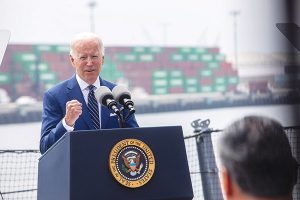Facing intense pressure to bring down inflation any way they can, members of US President Joe Biden’s administration are reviewing whether to drop some of the billions in tariffs on China imposed by their predecessors. They should — not just because of the cost to Americans of leaving them in place, but because of the impact on ordinary Chinese.
The international system of free trade relies on a crucial principle: reciprocity. This logic shapes economic interactions between nations and it works both ways. While cooperation can spur cooperation, retaliation can just as easily prompt tit-for-tat trade wars. Tensions with China emerged in part because US businesses felt they were not getting equal access to Chinese markets. The destructive spiral intensified as China responded to each round of US tariffs with its own taxes on imports from the United States.
Reciprocity does not just affect the behavior of companies and governments. It also influences how ordinary citizens think about trade.
Over the course of 2019 and 2021, I ran a series of surveys in China with David Steinberg, a political scientist at the School of Advanced International Studies at Johns Hopkins University, to assess how the trade war with the US had affected Chinese attitudes. As we detail in a new study, the US tariffs have substantially increased public support for protectionism in China — a country whose modern success has been built in large measure on its trading prowess.
When informed about the tariffs imposed by then-President Donald Trump’s administration, respondents indicated they wanted China to adopt a more protectionist trade policy, too. We ran another survey in mid-2019, shortly after the US escalated the trade war by raising tariffs from 10% to 25% on $200 billion of Chinese imports. We found a sharp drop in baseline support for free trade, from about 6.5 points on a zero-to-ten scale to around 4.3. A third survey fielded in 2021 during the Biden administration found, yet again, that US tariffs had heightened protectionist sentiment in China.
The consistency of these findings across two years suggest that US trade policy has produced a durable increase in support for protectionism in China, regardless of which party holds the White House. Digging deeper, we found that this turn towards protectionism is only partially driven by the desire to retaliate against the US specifically. In fact, the tariffs appear to have increased support for protectionism as a general principle.
There are several reasons why this might be so. Tariffs may seem a legitimate means of self-defense. When the world’s largest trading nation repeatedly engages in protectionism, it no longer seems inappropriate for other countries to behave in a similar fashion. Additionally, the economic uncertainty created by the trade war might have led Chinese citizens to downgrade the benefits of free trade.
Why should free traders in the US care? Judging by its statements, not to mention its membership in the Regional Comprehensive Economic Partnership and bid to join the successor to the Trans-Pacific Partnership, the Chinese government still recognizes the value of a more open world trading system.
Yet Chinese leaders ignore public sentiment at their own risk. Past practice suggests the Chinese Communist Party is attuned to public opinion and takes street-level attitudes into account in its decision making, including on issues of foreign policy. A more protectionist Chinese public makes it harder for the government to justify liberal trade policies, which could in turn accelerate the world’s slide toward divisive trading blocs.
To sum up then: US tariffs have raised prices for American consumers and businesses without altering Chinese industrial policies. Efforts to resolve differences by getting China to purchase more US goods have also failed. And, rather than pushing China to liberalize, US tariffs have increased domestic pressure on the Chinese government to reject free trade in favor of self-reliance.
Lifting the tariffs entirely would have the biggest impact on inflation and also lower protectionist sentiments in China. But that may be impossible politically for Biden. Alternatively, his administration could set out a gradual timeline for tariff reductions, lifting the restrictions reciprocally if China also eliminates its retaliatory tariffs. This path would achieve the same ends but over a longer period of time. Reconfiguring the tariffs — lifting some while raising others — might help stem prices of some goods. It’s unlikely to increase support for free trade in China, however.
Finally, the Biden administration could reinvest in strengthening the World Trade Organization. Our research found that compared to unilateral tariffs, measures that challenged Chinese policies through WTO rules were less likely to trigger a protectionist response from Chinese citizens.
For decades, the US underwrote the smooth functioning of the international trading system. US leadership has been absent for too long. The longer Trump-era tariffs stay in place, the more overseas support for free trade crumbles. For more reasons than one, it’s time to end them.
—Bloomberg
Yeling Tan is assistant professor of political science at the University of Oregon and a non-resident senior fellow at the Peterson Institute for International Economics
 The Gulf Time Newspaper One of the finest business newspapers in the UAE brought to you by our professional writers and editors.
The Gulf Time Newspaper One of the finest business newspapers in the UAE brought to you by our professional writers and editors.

